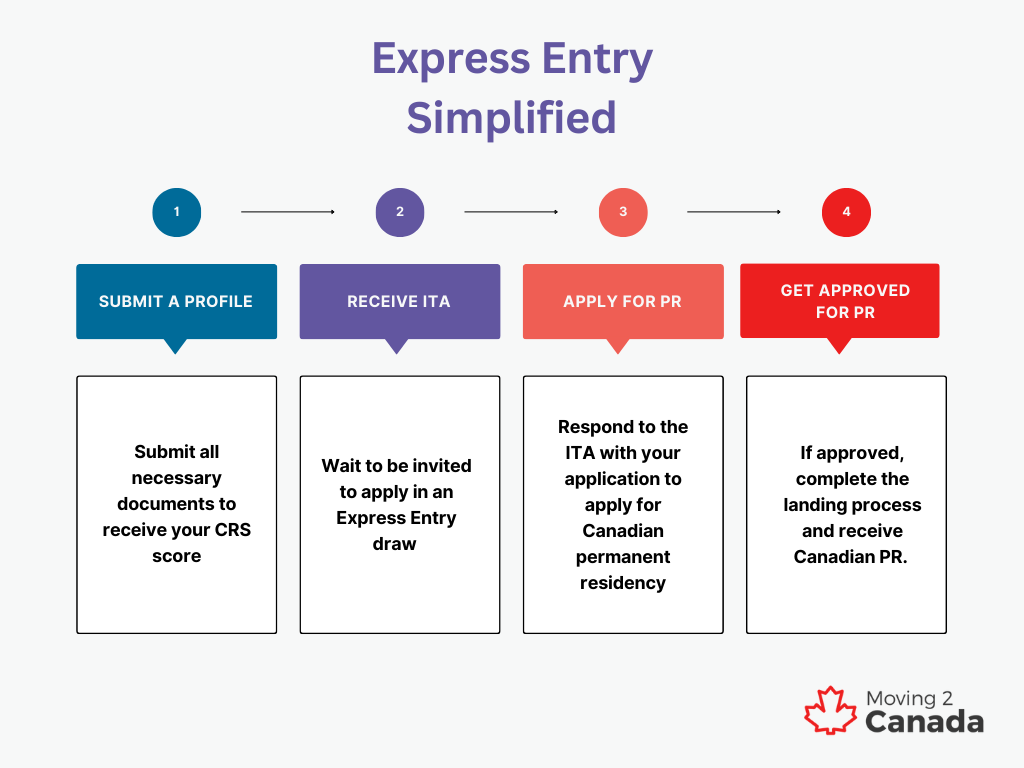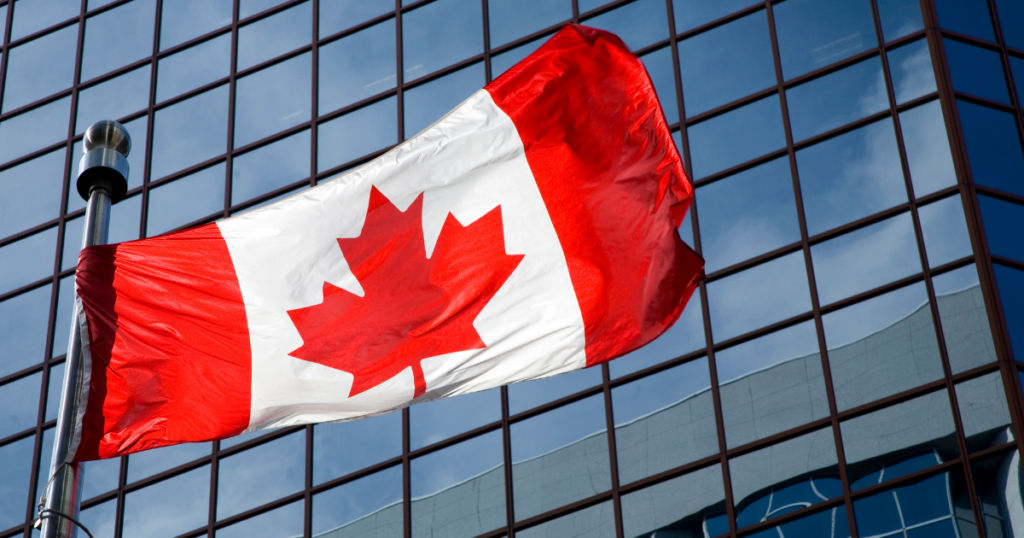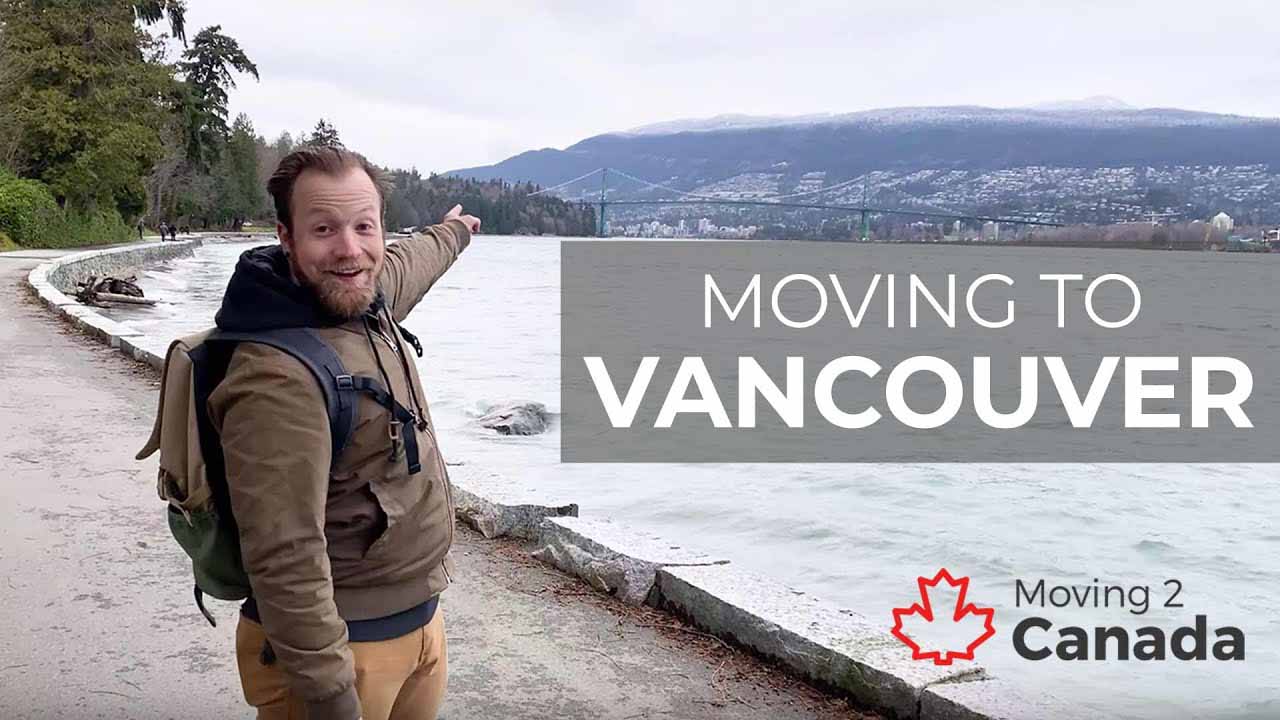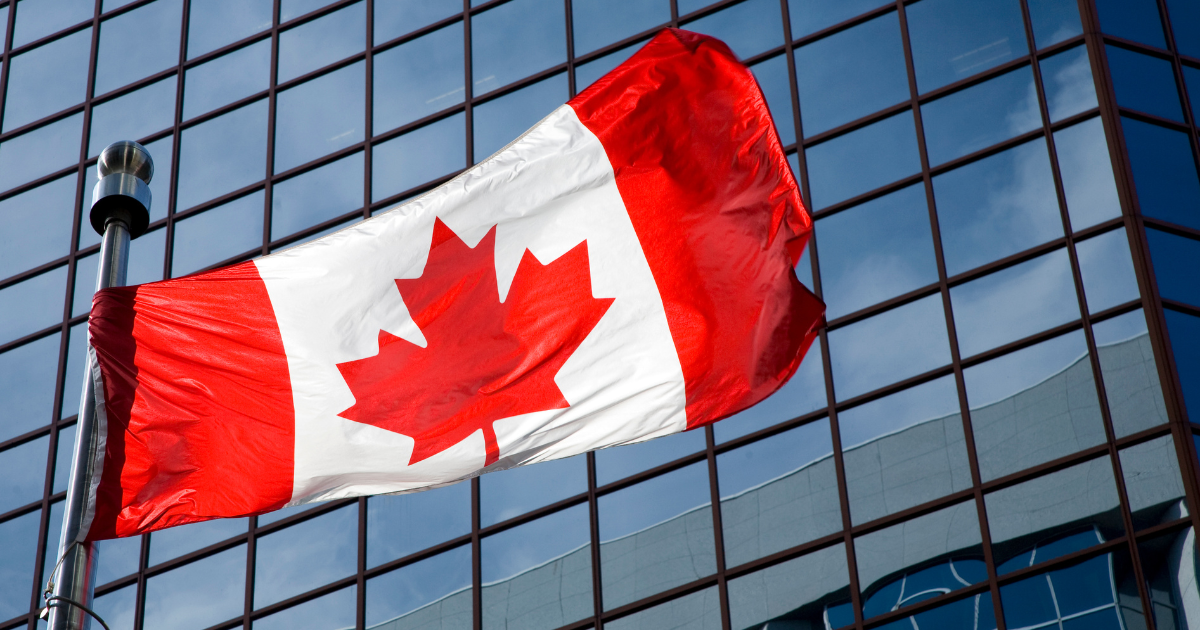Get immigration help you can trust.
Find the best immigration programs for you
Advertisement
Express Entry is the quickest way to immigrate to Canada. But, that doesn't necessarily mean everybody can immigrate to Canada through this fast-track pathway. This guide will help you understand if Express Entry Canada is the best way for you and your family, if applicable, to settle in Canada.
Individuals and families around the world can immigrate to Canada within just a few months through the Express Entry immigration selection system. First introduced in 2015, Express Entry has become the main driver of skilled worker immigration to Canada and one of the most popular immigration systems globally.
What you'll find on this page
What is Express Entry Canada?
Express Entry is an application management system used by Immigration, Refugees and Citizenship Canada (IRCC) to manage and process permanent residency applications received through three of Canada’s federal economic immigration programs for skilled workers, including the Federal Skilled Worker program, the Canadian Experience Class and the Federal Skilled Trade program.
As one of the main drivers of economic-immigration to Canada, it is a competitive immigration system, ranking all eligible candidates against one another and then inviting the best ranking candidates to apply for Canadian permanent resident status. Candidates are ranked against one another based on their age, education, language proficiency, work experience, and other factors.
Under Express Entry, individuals and families wishing to settle in Canada can become new permanent residents within just a few months.

Make sure your Express Entry profile is perfect.
How to apply to Express Entry Canada – A step-by-step guide

1. Determine Express Entry Eligibility:
Potential Express Entry applicants will need to be eligible under one of the following federal economic immigration programs.
- The Federal Skilled Worker Program (FSW) which targets foreign workers;
- The Canadian Experience Class (CEC) which targets Canadian workers; or
- The Federal Skilled Trades Program (FST) which targets trade workers
A portion of the Provincial Nominee Programs (PNPs) are aligned with the Express Entry program, but candidates still must be eligible under one of the three federal programs in order to enter the pool of candidates.
Though the eligibility requirements differ for each of the aligned- Express Entry program, all candidates are required to have at least one-year of skilled work experience, as well as a certain level of proficiency on an approved language test in either English or French. Also, Canada screens all Express Entry applicants for criminal history and medical issues that could make a person inadmissible.
2. Create an Express Entry profile:
Eligible individuals must submit a profile to the pool of candidates. The Express Entry profile acts as an Expression of Interest (EOI). Eligible candidates will automatically receive a score based on their profile and will be ranked against the other candidates in the pool.
The ranking score for Express Entry is based on the Comprehensive Ranking System (CRS) and is out of 1,200 points. Candidates can improve their rank by taking steps to improve their CRS score. The higher a candidate’s CRS score, the higher the likelihood they will receive an Express Entry Invitation to Apply (ITA),
The CRS score is used as a cut-off point in Express Entry draws. It is designed to project an Express Entry applicant’s likelihood of being economically successful in Canada. It ranks different candidates based on their career and educational history, language skills, and whether they have already received a qualifying job offer or provincial nomination in Canada, among other factors.
Candidates can receive additional points if they have a valid job offer from a Canadian employer, or if they’ve received a provincial nomination, or for a few other factors.
Express Entry eligibility and CRS Calculator
The Moving2Canada Express Entry CRS Calculator allows you to check your Express Entry eligibility and potential CRS points total at the same time, without you handing over personal contact information. No other CRS Calculator lets you do all of this.
Before creating your Express Entry profile, take a moment to find out which program you may be eligible for and how competitive your profile may be.
3. Create a job bank profile (optional):
Express Entry candidates without a job offer or a provincial nomination may then register in the Canada Job
Bank, a free public resource used to help Canadian employers identify and select workers possessing the skills they require. This step used to be mandatory, but became voluntary as of June 2017.
4. Improve your CRS score:
Candidates in the Express Entry pool who have not yet been selected are able to improve their profile and score. They can do this by submitting new and updated information. Examples include: increased language proficiency scores, educational credentials assessments, adding additional foreign work experience or Canadian work experience, and/or obtaining a qualifying job offer or a provincial nomination. See our tips for improving your CRS score.

The Express Entry Roadmap
5. Receive an Invitation to Apply (ITA):
Immigration, Refugees and Citizenship Canada (IRCC) conducts Express Entry draws at regular intervals (usually every two weeks). In these draws, Express Entry candidates above a certain rank are invited to apply for Canadian permanent residence. If a candidate is not invited, their profile will expire after 12 months, at which point they may submit a new profile.
6. Submit your application for permanent residence:
If you receive an Invitation to Apply (ITA), you will be given 60 days to submit a complete application for permanent residence. In this application you will have to provide extensive personal information along with supporting documentation. The entire application is submitted electronically.
After you’ve submitted your application, you have to wait for a final decision to be issued. 80 percent of Express Entry applications are processed in six months or less. If your application is approved, then you will receive authorization to activate your permanent resident status in Canada to become a Canada PR (permanent resident).

Get personalized immigration help — for free!
Things to note in your Canadian Express Entry application
If you receive an Invitation to Apply, you may submit an official application for permanent residence. This application is completed and submitted entirely online. Here are a few things to keep in mind about the final permanent residence application:
1) You may need to show proof of settlement funds.
All FSW and FST applicants must demonstrate that they have enough money to support themselves and their family members during their settlement into Canada. Applicants with a valid job offer in Canada, as well as CEC applicants are exempt from this requirement.
The figures below are in place as of April 25, 2023.
| Number of family members | Required funds (in CAD) |
|---|---|
| 1 (single applicant) | $13,757 |
| 2 | $17,127 |
| 3 | $21,055 |
| 4 | $25,564 |
| 5 | $28,994 |
| 6 | $32,700 |
| 7 | $36,407 |
| For each additional family member, add | $3,706 |
2) “Job Offer” really does mean job offer
A big misconception held by many in Canada who are working on LMIA-exempt work permits, such as the IEC Working Holiday Visas, is that the “job offer” that they have from their current employer is equal to what IRCC considers a valid job offer for Express Entry.
Whenever you see the phrase, “valid job offer”, this means that the job meets a number of conditions specific to Express Entry. Find out more about what makes a job offer valid in Express Entry.
3) Everything carries over from your Express Entry profile
Did you fudge a few months of work experience on your profile without knowing the real consequences? Well, you’re in for a big surprise . . .
The majority of the important data that you enter into your Express Entry profile carries over automatically into your electronic Permanent Residence (PR) application. Any changes you make at this stage could jeopardize your application.
Consequently, it is important to be conscious about everything that you enter in the first time around. You will be asked to provide documentation to support the claims you’ve made.
Lying on an immigration application is a serious crime and can result in a five-year ban from Canada.
4) Federal Skilled Trade and Canadian Experience Class applicants – get your Educational Credential Assessment (ECA)!
Even though the educational credential assessment is not a requirement for FST and CEC, you should still get it done. Once the ECA is completed and added to an Express Entry profile, scores typically increase drastically. Therefore, if you’re a FST or CEC applicant with a post-secondary credential, begin the ECA process as soon as possible.
5) Try to score as high as you can in your language proficiency tests.
Even if you only need to show a Canadian language benchmark (CLB) level 7 for your language proficiency, you should aim to score as high as you can to increase your CRS score. Scoring CLB level 9 rather than CLB level 7 can drastically increase your CRS score.
Advertisement
How many points do you need to immigrate to Canada through Express Entry?
This question is best answered in two parts: before entering the Express Entry pool, and once in the pool.
- Before entering the Express Entry pool
There are three Canadian immigration programs through which you may become a candidate in the Express Entry pool: the Federal Skilled Worker Program (FSW), the Federal Skilled Trades Program (FST), and the Canadian Experience Class (CEC). All 3 programs target skilled workers with either foreign work or Canadian work experience.
The Federal Skilled Trades Program program is for qualified tradespersons with recent experience in a listed occupation, and Canadian Experience Class is for people with recent skilled Canadian work experience. Neither the Federal Skilled Trade program nor the Canadian Experience Class require candidates to satisfy a points requirement to be eligible to submit a profile.
The FSW program, on the other hand, is open to people around the world who satisfy a minimum points requirement for eligibility. Note: this is a completely separate points system from the CRS score. Under the FSW points-grid, you need to be awarded at least 67 points out of 100 in order to enter the pool. You can view the FSW points grid and factors here.
- Once in the Express Entry pool
In the Express Entry pool, candidates — regardless of which program they are eligible under — receive a CRS score. This score determines where an individual candidate ranks. When IRCC conducts an Express Entry draw, this score is the main determining factor to decide which candidates are invited to apply for permanent residence.
Do take note that the CRS cut-off thresholds are not pre-determined, and that the threshold is subject to change for different Express Entry draws. Ultimately, there is no strict or written number of points you need to immigrate to Canada through Express Entry, but previous draws give an indication of which candidates have the best chances of being invited to apply, based on CRS score.
Category-based selection
Immigration, Refugees, and Citizenship Canada (IRCC) also holds category-based draws that invite candidates based on factors like language ability and work experience. These draws tend to have lower CRS requirements because less candidates in the pools are competing for invitations.
To be eligible for category-based selection, you must meet the requirements of the category. For example, in order to be invited for a French draw you need at least a language score of 7 in all four language abilities. To be invited in a STEM-specific draw, you need at least six months of work experience in an eligible occupation within the three years preceding the date that IRCC receives your application.
Keep in mind, IRCC may change the Express Entry categories depending on Canada’s economic goals for immigration.
How much does it cost to immigrate to Canada through Express Entry?
See the table below for an overview of the costs associated with immigrating to Canada through the Express Entry system. You should note that there are no government fees due on submitting your Express Entry profile.
This table may not include all costs. Incremental costs for shipping, etc. are also not included.
|
||
|---|---|---|
| Item | Cost | Is this required, or optional? |
| Edcuational Credential Assessment (ECA) | $200+ | Required for FSW candidates, and recommended for FST & CEC candidates, who studied outside Canada |
| Language test(s) | $200+ | Required |
|
||
| Item | Cost | Is this required, or optional? |
| Police clearance certificate(s) | Depends on the country. May range from free service to up to $100 or more. | Required |
| Medical report | $200+ | Required |
| Representation by a lawyer or regulated consultant | Ranges, but fees typically range from $2,000 to $5,000 | Optional |
|
||
| Item | Cost | Is this required, or optional? |
| Processing fee | $850 | Required |
| Right of permanent residence fee | $515 | Required |
| Addition of accompanying spouse/partner | $850 for processing fee, $515 for right of permanent residence | Required, if applicable |
| Addition of dependent child(ren) | $230 per child | Required, if applicable |
Advertisement
How long does it take to immigrate to Canada through Express Entry?
Canada’s Express Entry system is designed to provide fast permanent residence to Canada. For eligible Express Entry candidates who receive an invitation to apply (ITA) soon after entering the pool, and who then quickly submit a complete Canadian permanent residency immigration application, the entire process may take six months, or even less. However, the following variables may extend this timeline of you becoming a permanent resident and should be taken into account:
- While some candidates are invited soon after entering the Express Entry pool, other candidates, depending on their CRS score and CRS cut-off thresholds in Express Entry draws, may only receive an ITA months later, or not at all.
- Some invited candidates may be ready to apply for immigration to Canada soon after being invited, while others may need more of the 60 days allotted.
- While IRCC aims to process permanent residence applications within six months, some applications may take longer, and decisions on other applications may take less than six months.
What are my chances of successfully getting permanent residence through Express Entry?
Before entering Canada’s Express Entry pool, do a rough calculation of what your CRS score could be by using the Government of Canada’s CRS calculator*. Compare this score to the CRS score cut-off in the latest express entry draws. Are you close to the cut-off? Above the cut-off? Far below the cut-off?
This should give you an idea of your chances of success in Express Entry. If you are far below the cut-off score, take a look at our guide to improving your CRS score, our guide to alternative immigration options for Canada, and our resource for individuals over 35 looking to immigrate to Canada.
*Your actual CRS score may differ from the score you received from the CRS calculator. Your actual CRS score is automatically generated based on the information and documents included in your Express Entry profile.
Once you are in the pool, it is essential that you track the express entry draw trends and do all that you can to increase your CRS score. Increasing your CRS score will increase your chances of becoming a permanent resident of Canada.
What is the difference between Express Entry and PNP’s?
Express Entry is the system used by the Canadian government to select and process applications for permanent residence. Provincial Nominee Program’s (PNP’s) are immigration programs offered at a provincial level. There are 10 provinces and 3 territories in Canada. Anyone looking at immigrating to Canada should explore their Canada Express Entry and PNP options when looking to immigrate to Canada and gain Canadian permanent residence.
A big difference between Express Entry and Provincial Nominee Program is the skilled worker element. If an applicant does not have skilled work, they will not qualify under the Federal Skilled Worker program, Canadian Experience Class or Federal Skilled Trades program and therefore would not be able to enter the Express Entry pool. PNP’s that work outside the Express Entry system do not always require skilled workers therefore an applicant with no skilled experience should look for PNP’s.
Many Provincial Nominee Program’s have permanent resident options for those with Canadian work experience, therefore any one with Canadian work experience should look at available PNP’s in addition to the Canadian Experience Class.
Can I have an Express Entry profile and a Provincial Nomination Program profile at the same time?
Yes, applicants can have both an Express Entry profile and a PNP profile active. As there are many provinces, it is common for applicants to have multiple PNP profiles active. In most cases, PNP’s are used to strengthen an Express Entry profile. In the event an Express Entry candidate receives a notification of interest from a province, they should withdraw all other PNP profiles before they apply for provincial nomination.
What happens to my Express Entry profile if I get a Provincial nomination?
If the provincial nomination was received through an Express Entry aligned PNP, once a nomination certificate is issued and accepted, the applicant will receive an additional 600 points. With an additional 600 CRS points, the applicant will receive an invitation to apply (ITA) in the next Express Entry draw.
What Provincial Nominee Programs use the Express Entry system?
There are many provinces that use the Canada Express Entry system to select skilled immigrants. These provinces offer ‘enhanced nominations’ where applicants benefit for the speedy Express Entry program processing for permanent residence of 6 months.
Most provinces have an Express Entry aligned PNP. Here are some of the most popular ones:
British Columbia – Express Entry streams
Manitoba Express Entry Pathway
New Brunswick Express Entry Stream
Newfoundland and Labrador Express Entry Skilled Worker
Nova Scotia Experience: Express Entry
Ontario French Speaking Stream
Saskatchewan Express Entry: International Skilled Worker
It important to note that in all of the above PNP programs, the applicant must also be a skilled immigrant, eligible for one of the three immigration programs that use the Express Entry system. These are the Federal Skilled Workers program, the Canadian Experience Class and the Federal Skilled Trade program.
Read more: Here are the 5 easiest provinces to get PR in Canada
How can you get more information on Canada’s Express Entry program?
We have designed the Express Entry Roadmap: a free service designed to inform you about the Express Entry application and process so that you can be empowered to make the best decisions when it comes to your immigration. Sign up for the Express Entry Roadmap here.
Seeking further clarity and would like to speak with a professional in regards to your situation? See the Canada Immigration Advice page for more.
Related Content

Educational Credential Assessments for Foreign-Trained Architects: IRCC Announces Changes
Read more

Express Entry Draw Weekly Recap – April 8 to 12, 2024
Read more

Latest Express Entry Draws Results
Read more

Express Entry Draw Weekly Recap – March 25 to 29, 2024
Read more









